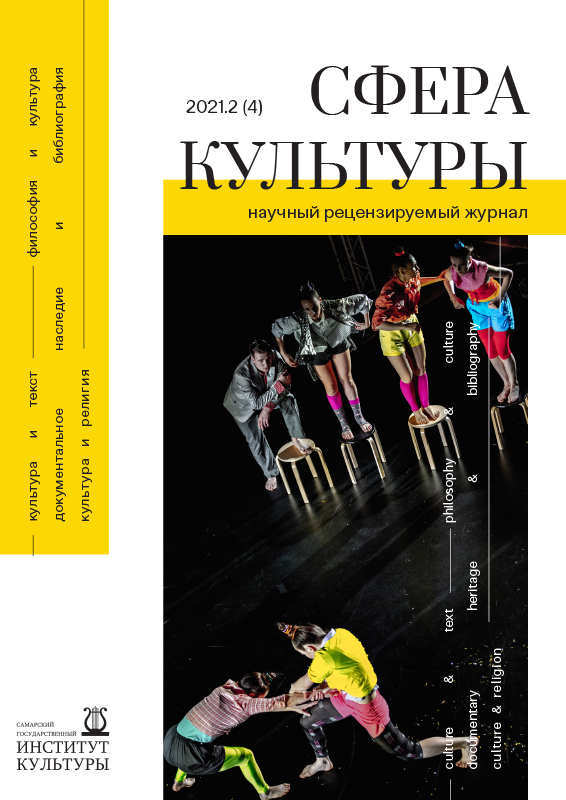Том 2, № 2 (2021)
- Год: 2021
- Выпуск опубликован: 15.09.2021
- Статей: 8
- URL: https://journals.eco-vector.com/2713-301X/issue/view/4314
Весь выпуск
Статьи
«Похвала лету» В.К. Тредиаковского: о грибах, мухах и механизмах культурной памяти
Аннотация
Стихотворение В.К. Тредиаковского «Похвала лету» не включалось в собрания его сочинений, оставаясь в списках. Текст, который здесь впервые публикуется, минуя печать, запал напрямую в коллективную память как карикатурный образчик его поэзии и там со временем утвердился уже в новом эстетическом статусе. В 1840-е гг. стихотворение, несмотря на иронические кавычки, в которые его заключали любители поэзии, вновь стало использоваться в исконной функции – функции лирического высказывания.
 13-19
13-19


Эволюция стиха как машины
Аннотация
В статье рассматриваются примеры использования физических терминов для описания литературных произведений. Слова «сила», «мощность», «машина» издавна применялись как инструменты для толкования текстов. Если стихотворение — это машина, сделанная из слов, то оно производит эффект или выполняет предназначенную работу. Работа, проделанная этой «машиной из слов», происходит в сознании читателя, в его душе и обогащает новыми знаниями его разум. Автор доказывает гипотезу на примерах из поэзии прошлого и нынешнего веков. Показаны приемы, усиливающие аналогию стиха и машины, а также эволюционные изменения, происходящие как в поэзии, так и в машинах. Это позволяет по-новому увидеть сложные процессы в современном мире.
 20-26
20-26


Идеализм как «состав преступления» (или о «реставрации» А.Ф. Лосевым мира вечных идей)
Аннотация
На современном этапе жизни нашей страны по-прежнему одним из важнейших вопросов является отношение властных структур к такому институту культуры, как наука. Растет степень вмешательства государства во внутренние дела академического сообщества, усиливается мелочная опека научных учреждений и контроль их интеллектуальной деятельности. Изучение процессов становления советского государства в 30-е гг. XX в. показывает, что такое вмешательство органов власти в деятельность научных учреждений, особенно гуманитарного профиля уже было. В данной статье на примере организации травли научной деятельности одного из значительных философов и филологов СССР Алексея Федоровича Лосева осуществлена попытка показа картины начала репрессий против научных кадров. Острие репрессий было направлено преимущественно против гуманитарной науки, которая, по мнению правящей верхушки, противостояла идеологии нарождающегося сталинизма. Обвиняли ученых, прежде всего, в приверженности идеализму, а, следовательно, и к буржуазии. В конце концов, внутренняя логика эволюции репрессивного механизма привела к разгрому в конце 1940-х – начале 1950-х гг. генетики, затем кибернетики, социологии в Советском Союзе, что привело к отставанию страны в этих отраслях науки, не преодоленному до сих пор.
 29-37
29-37


Кросс-культурные композиции ландшафта контактных зон цивилизационных сопряжений
Аннотация
В статье на примере кросс-культурных композиций в пространстве Беларуси рассмотрена трансграничная динамика интеллектуальных традиций европейских цивилизационных структур. Новизна излагаемых результатов исследований заключается в описании тенденции трансформации кросс-культурных композиций под влиянием исторических эпох. Рассмотрены феномены Возрождения, второй схоластики и эпохи барокко, романтизма и постмодернизма. Кросс-культурные композиции имели конструктивное начало, которое доминировало над технологиями столкновения цивилизаций. Это видно по культурному ландшафту Беларуси. В нем получила реализацию стратегия второй схоластики вытеснить конкурентов из культурного пространства Беларуси аргументами образования и искусства. Кросс-культурная композиция романтизма усилила в Беларуси позиции общеевропейской тенденции к интеграции элитарной культуры с элементами народных традиций. Этот акцент способствовал становлению ориентализма и активному участию уроженцев Беларуси в изучении Востока. Модернизм сделал акцент на адаптацию изобразительного искусства к техногенной реальности и разработку методологии диалога. Витебск стал ключевым элементом кросс-культурной композиции модернизма.
 38-47
38-47


Влияние реформации на развитие образования, науки и культуры в Англии в раннее новое время
Аннотация
В статье исследуется культуротворческий потенциал Реформации и протестантизма. Новое религиозное течение повлияло на все сферы общественной жизни, включая образование, науку и культуру. Идеи протестантизма, основанные на необходимости самостоятельного чтения текста Священного Писания для каждого верующего без каких-либо посредников и внешних авторитетов, стали формировать в протестантской культуре особый тип личности. Человек стал стремиться получать образование, вырабатывать собственную точку зрения на явления и процессы естественной и социальной природы. Исследование показало, что в развитии английского протестантизма отмеченные в статье тенденции привели к «образовательной революции» второй половины XVI – XVII веков. Рост численности студентов университетов в этот период свидетельствует о стремлении молодых людей к прагматическому знанию в научных исследованиях. Опора на слово во всех сферах культуры сформировала специфический логоцентризм изучаемого в статье периода английской истории.
 51-62
51-62


Документы личного происхождения тверских купцов как культурное наследие
Аннотация
В статье рассмотрены традиции ведения документов личного происхождения, существовавшие в купеческих семьях городов Тверской губернии в конце XVIII – первой половине XIX века. Дошедшие до нас записи в основном составлялись синхронно происходившим событиям, но они включают в себя и записи предков, и воспоминания авторов, что придает им характер мемуаров. В некоторых семьях ведение записей было делом всей семьи, и это дело помогало воспитанию и образованию детей, развивало у них грамотность, наблюдательность.
 65-76
65-76


Спецэффекты советского кино: метод перспективного совмещения
Аннотация
Российский государственный архив в г. Самаре – уникальный центр хранения документов по истории отечественной науки и техники. Истории советского кинематографа посвящено немало интересных документов из фонда Всесоюзного научно-исследовательского кинофотоинститута. В мировом кинематографе 1920–30-е гг. были временем технических экспериментов и поисков. Лучшим способом для решения все более усложнявшихся постановочных задач стали комбинированные съемки. Предлагаемая публикация двух архивных документов посвящена подробному описанию практического применения одного из методов комбинированной съемки – методу перспективного совмещения. С применением этого метода были сняты кинокартины «Золотой ключик» (1938) и «Руслан и Людмила» (1939) – фильмы, ставшие определенной вехой в развитии спецэффектов мировой истории кинематографа.
 77-84
77-84


Роспись содержания журнала «Трудолюбивая Пчела» (1759)
Аннотация
Статья содержит роспись всех 12 номеров первого частного ежемесячного журнала «Трудолюбивая Пчела» (1759), издателем которого был русский писатель, поэт, драматург Александр Сумароков. Журнал включал как оригинальные сочинения, так и переводы из античной и западноевропейской литературы. Всего было опубликовано 213 произведений, из них 161 оригинальное и 52 переводных. С точки зрения жанрового разнообразия, в журнале представлены жанры «аллегория», «басня», «идиллия», «молитва», «монолог», «ода», «песнь», «письмо», «притча», «псалом», «разговор», «рассуждение», «речь», «рондо», «сатира», «сказка», «слово», «сонет», «станс», «эклога», «элегия», «эпиграмма», «эпистола». В статье дается биографическая информация об основных авторах и переводчиках журнала, высчитывается процентная доля их участия во всех публикациях журнала.
 85-111
85-111












